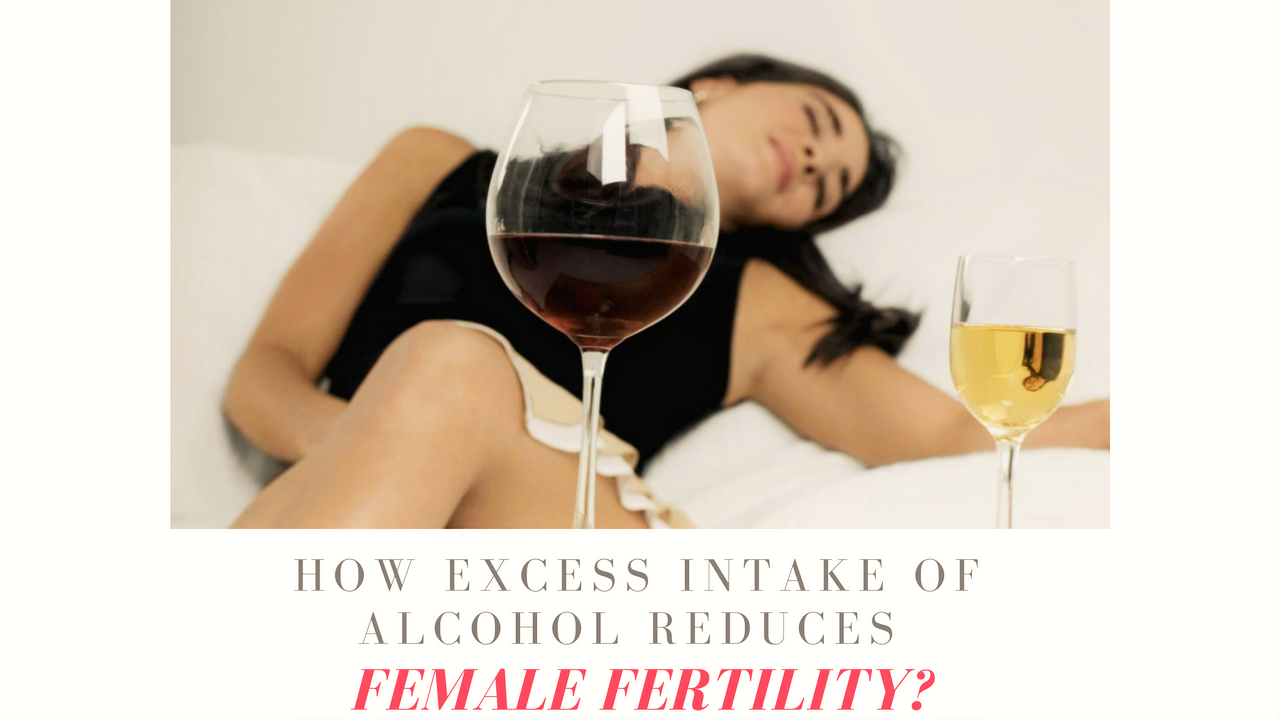How Excess Intake of Alcohol Reduces Female Fertility?
This post was last updated on January 21st, 2019

Alcohol intake can affect both male and female fertility. Even intake of alcohol in moderation can make it difficult for both men and women to conceive baby. Alcohol intake affects men and women fertility in different ways, men experience low sperm quality, low testosterone levels, and erectile dysfunction and women experience irregular periods, excess bleeding and difficulty in conceiving baby. According to the medical recommendations women who try to conceive baby or those who are pregnant should avoid drinking alcohol to lower the health risks of baby.
Contents
ToggleResearch on Alcohol and Female Fertility
According to the latest study, 24% of couples in developed countries experience infertility. However, it’s unclear the extent to which alcohol intake affects women fertility. But according to the researchers, it would be wise to stay away from binge drinking because it might lead to potential disruption in menstruation and harm to baby during early pregnancy.
The studies claimed by the Journal of Obstetric Gynecologic Neonatal Nursing says, if couples experience difficulty in conceiving then both partners need to cut down their alcohol intakes. According to a case study, women who consumed 14 or more servings of alcohol per week were diagnosed with 37 pregnancies in 3017 cycles compared to 1381 pregnancies in 8054 cycles in women who didn’t consume alcohol at all.
The negative effects of alcohol consumption on fertility especially female fertility are much more. Even consumption of alcohol in moderate quantity may lower fertility and chances of getting pregnant. However, alcoholic beverage consumption is well accepted worldwide in almost all countries. But the increase in infertility rates impels us to wonder if regular alcohol consumption is contributing to this serious problem. It is well known that heavy or chain drinkers are more prone to all sorts of health issues, but even 5 or less drinks alcohol consumption a week may lead to minor fertility issues in both men and women. Several researches have concluded that even women who consumed 5 drinks or less per week were diagnosed with lowered fertility. But the great news is that moderate alcohol beverage consumption did not really affect the duration of time it took the couples to conceive the baby as compared to those couples who drank more than 5 alcoholic beverages a week as it took longer to conceive.
Negative Effects of Alcohol on Female Fertility
Coming to medical terms, alcohol depresses the adrenal glands slowing down the release of hormones that get produced by the adrenal glands directly impairing the egg health and libido in women. Even in men with poor sperm quality, excess consumption of alcohol was related with reduced number of normal sperm. Alcoholic beverages and drinks contain a lot of sugar which decreases fertility on excessive consumption leading to insulin resistance, hormonal imbalance, yeast infection, poor immunity and deficiency of vitamin and minerals. All these effects of alcohol reduces overall male and female fertility making it difficult to conceive baby. Moreover, drinking alcohol during the time of ovulation in women lowers the chances of successful conception.
Several studies and researches carried out on the effects of alcohol on human concluded different serious issues when experimented on lab specimens such as multiple female fertility problems which included reduced ovarian weight, ammenorrhea (delayed/absent menstruation), lowered hormone concentrations, interference with sperm cell transfer through fallopian tube and inhibited ovulation.
Recommended: Why Does Alcohol Affect Women More than Men?
Safe Guidelines on Alcohol and Female Fertility
According to The National Institute for Health and Clinical Excellence (NIHCE), the independent organisation held for imparting national guidance for promoting good health preventing and treating ill health, the maximum risks of miscarriage in the first trimesters of pregnancy is particularly crucial and important for women and avoiding consumption of alcohol completely during that period is the safest way to give birth to a healthy baby. However, it is very essential to understand that consuming alcohol carries the risk throughout the entire pregnancy process, not just only for the first trimesters. Hence, it is advisable and recommended to avoid drinking alcohol even in moderate or low amounts if any couple is planning to have a baby.
Recommended For You
COVID-19 and CBD Oil: What to Do to Prevent The Spread?
Priyadarshini Muduli
A full time passionate writer with imperishable determination to bring healthy, smart and pragmatic changes individually and socially. Concentrate especially on lifestyle, life and personal improvement, relationships, mental health and behavior, viral issues and literature based subjects.




